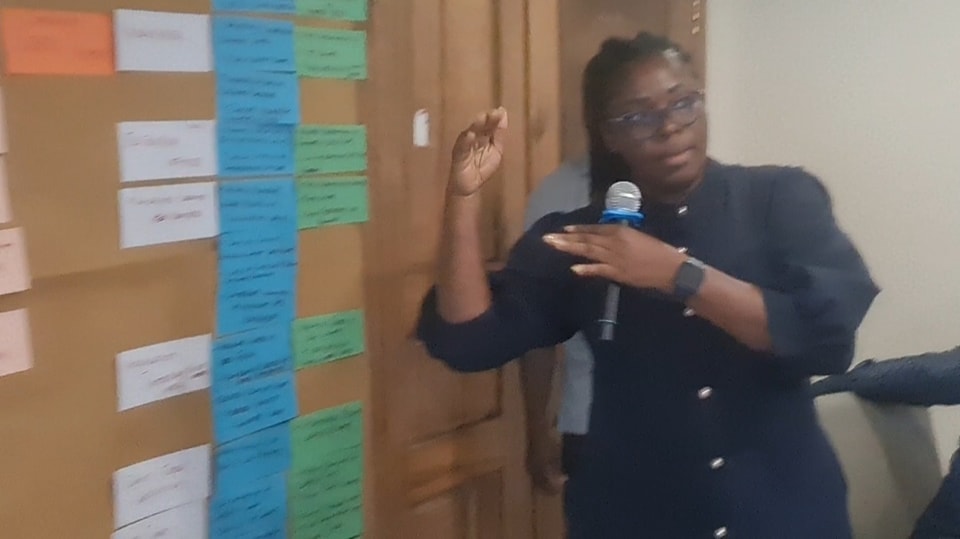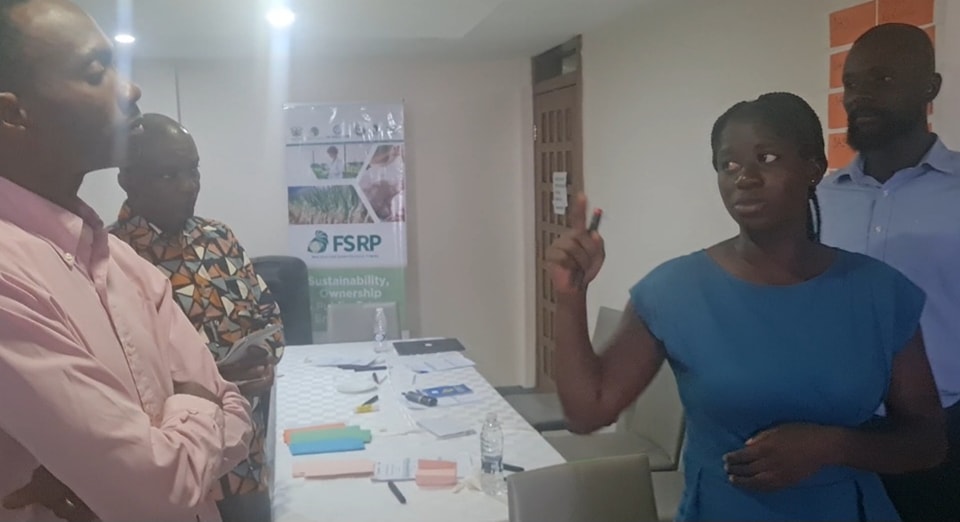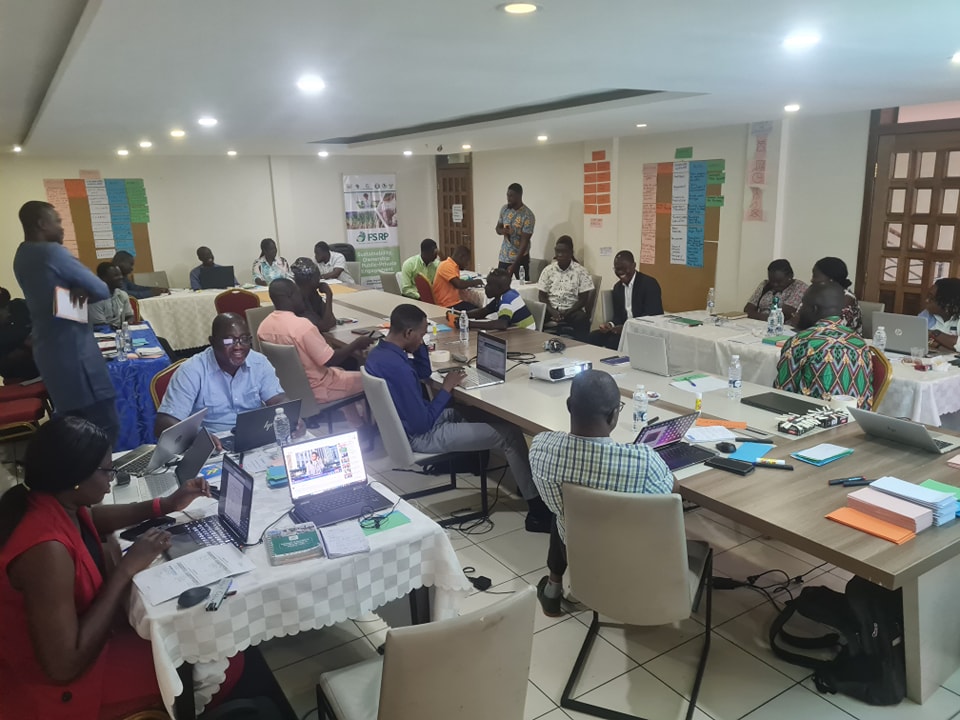CORAF & FSRP ACTIVATE MEDIUM TO DISSEMINATE TECHNOLOGY, INNOVATIVE BEST PRACTICES.
The West Africa Food System Resilience Programme (FSRP Ghana) and the West and Central African Council for Agricultural Research and Development (CORAF) have activated a medium for value chain actors in agriculture to come together to diagnose challenges, identify opportunities and find ways to achieve common desired goals, in Ghana.
Referred to as an Innovation Platform (IP), it is a vibrant network of value chain actors, for jointly identifying value chain challenges, the interests and concerns of the various actors, and finding innovative and comprehensive ways to resolving these challenges.
They include Producers, Processers, Input dealers, marketers/traders, transporters, Traditional rulers, MoFA Extension, Researchers etc., across target areas, working together with MoFA Extension and Researchers to exchange knowledge, facilitate linkages for support and address outstanding challenges.
CORE TEAM
In line with this, a team of experts from the West and Central African Council for Agricultural Research and Development (CORAF, Benin), in consultation with FSRP-Ghana, were on the ground in Accra to orient and refresh carefully selected officials from a cross-section of key institutions. They comprised Agricultural Extension Agents (AEAs), District Agric Officers, technical experts from Directorates of the Ministry of Food & Agriculture (including Directorate of Extension Services and Regional Agric Departments), the Crop Research Institute of Council for Scientific & Industrial Research (CSIR-CRI) and the Ghana Irrigation Development Authority (GIDA). The engagement was a training of trainers who would use the methods adopted from the sessions to establish innovation platforms that disseminate knowledge to farmers and value chain actors in FSRP’s target areas.
CORE POINTS
With a focus on the concept of Integrated Agriculture Research for Development (IAR4D), the consultative sessions applied hands-on methods of Innovation Platforms (IPs) to organize value chain actors to identify challenges, propose solutions, and mobilise resources to address the challenges. The sessions commenced by first treating ‘the theory of change’ and how to introduce and drive change constructively. That was then followed by practical sessions on: the process of establishing IPs, the integration of a marketing approach in IPs, the management and facilitation of IPs, the documentation, monitoring & evaluation of IP performance, and the advocacy/mobilization of resources for IPs.
The facilitators, Laurent Glin, Mr. Asogba Claude, Romeo Sosu and Teko Augustine Tivovi - all of Africa Green Corporation (under CORAF), organised the officials into IP working groups, each of which was assigned to diagnose and prescribe solutions to realistic agric-related cases cutting across value chains of maize, rice, tomato and poultry.
CORELATIONS
In tune with the knowledge-sharing characteristics of Innovation Platforms, some participants shared findings of research work and studies they had worked on.
Rahinatu Yussif, an AEA at Offinso North shared findings from her research on her ongoing research: “Septoria Leaf Spot Disease of Tomato in the Offinso-North District of Ghana & Evaluation of Caldo Bordeles Valles 20 WP Against the Disease”*.
Jaafar Billey, a Management Information System Officer stationed at Prampram in the Ningo Ningo-Prampram District shared his findings on the “Residual Effect of Rice Straw Biochar on Okra & Maize Productivity, 7 Years After Amendment to a Tropical Acrisol”*.
Mr. Isaac Osei Tutu, a researcher at CSIR shared his experiment, “Effect of Harvesting Stages on Seed Quality Characteristics of Three Soyabean Varieties”*.
[*details of these studies will be shared in a subsequent article]
FSRP’s Operations Manager, Mr. Philip Laryea acknowledged that the inter-institutional synergies occasioned by Innovation Platforms is an opportunity worth exploiting to achieve food system resilience in Ghana and West Africa. He said a family-tree-type database of Innovation Platforms under FSRP would be developed and announced in due course.
The Project Coordinator of FSRP, Mr. Osei Owusu-Agyeman in his statement noted that the implementation of FSRP hinges heavily on the principle of the sustainability of the interventions made by the project long beyond the project’s lifespan; and that depends mostly on a vibrant operationalisation of Innovation Platforms. He therefore charged members to push themselves beyond their comfortable capacities and become masters in the art of driving sustainable change. He advised them to cultivate and imbibe the habit of taking down written notes of submissions made by other stakeholders during engagements.
CORAF (a sub-regional organization made up of the national agricultural research systems of 23 countries in West and Central Africa) promoted the establishment, operationalization, and adaptation of Innovation Platforms under the West Africa Agricultural Productivity Program (WAAPP) as a key tool for project implementation through knowledge dissemination, to achieve the needed impact.
The West Africa Food System Resilience Programme (FSRP) is a World Bank funded program promoted by ECOWAS for participating countries. It is to strengthen food system risk management, improve the sustainability of the agricultural productive base, and harmonize agricultural markets in the West African sub region.




Leave a comment
Comments (0)
No comments yet. Be the first to comment!